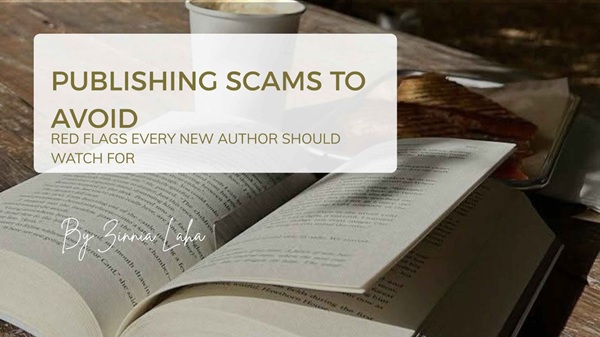For new authors, getting published is often the fulfillment of a lifelong dream. You’ve poured your heart into your manuscript, revised it a dozen times, and now you’re ready to share it with the world. But amid the excitement, it’s easy to overlook some of the darker corners of the publishing world. Unfortunately, there are countless book publishing scams targeting writers—especially those who are new, eager, and unfamiliar with how the industry truly works. From vanity presses disguised as traditional publishers to fraudulent editors promising bestseller status, the publishing world has its share of traps. The good news? Most of these scams follow predictable patterns, and once you know what to look for, you can avoid them with confidence.
One of the most common scams preying on new authors is the vanity press in disguise. These companies present themselves as traditional publishers, offering to publish your book—but only after you agree to pay them a fee. In legitimate traditional publishing, the publisher covers all the costs: editing, cover design, distribution, and marketing. You, the author, are paid—usually in the form of an advance and royalties. If a “publisher” is asking you to foot the bill upfront, you’re not being traditionally published—you’re being sold a service. That doesn’t make it inherently wrong, but the deception often lies in how the deal is framed. Many vanity presses use manipulative language to make authors feel chosen or “selected,” when in reality, they accept almost every manuscript that comes through their inbox.
Another major red flag is the promise of guaranteed success. Any publishing company, agent, or editor who promises you bestseller status, thousands of sales, or international fame should be met with immediate suspicion. Publishing is a deeply subjective and unpredictable industry. Even books with large marketing budgets and traditional backing sometimes fail to find a wide audience. No one can guarantee success—least of all a company asking you to pay for it. Scammers often use these empty promises to upsell expensive “marketing packages” that include things like press releases, blog tours, or social media promotions. While these services aren’t inherently bad, they’re rarely worth the inflated prices scammers charge, and they often have little to no impact on your book’s actual sales.
Fraudulent literary agents are another danger. A legitimate literary agent will never ask for upfront fees. Their income comes from commissions—typically 15% of what you earn from book deals and subsidiary rights like film or foreign translation. Scam agents, however, often ask for “reading fees,” “submission fees,” or charges for editing services before they’ll even consider representing your work. These agents have no real intention of helping you land a book deal; they make their money by bleeding hopeful writers dry. Always check an agent’s background. Reputable agents will have verifiable sales, client lists, and industry connections. Resources like the Association of Authors’ Representatives (AAR) and QueryTracker can help you verify whether an agent is legitimate.
Scams can also take the form of fraudulent or unqualified editors. As a new author, it’s understandable to want your book polished before submitting or self-publishing. But not everyone who calls themselves an editor is qualified to do the job. Some may have no real editing experience, offer vague promises, or charge exorbitant fees for minimal work. Before hiring an editor, ask for a sample edit. Look at their previous work and testimonials. Verify their credentials. A good editor should be transparent about their process and willing to offer references or samples without hesitation.
Contests and awards can be another minefield. While there are many reputable literary competitions, there are also numerous scams designed to exploit your desire for recognition. Be wary of contests that charge high entry fees with little transparency about the judging process or prize details. Some “awards” are essentially pay-to-play schemes—where every entrant “wins” something, just to upsell you trophies, certificates, or PR packages. These offers often come with flattery-laced emails congratulating you for being selected, followed by an urgent push to purchase their overpriced services. If an award or contest seems too easy to win, or the organization offers little credible information about judges or past winners, it’s likely a scam.
Social media and email have become common hunting grounds for scammers. You may receive DMs or emails from people claiming to be agents, publishers, or publicists who “discovered” your book or profile. Often, they offer vague praise and ask you to invest in a promotional opportunity or publishing package. Always be skeptical of unsolicited offers—especially if they pressure you to act quickly or send money. Legitimate industry professionals don’t cold-message authors on social media with offers of publishing deals. Take time to research anyone who contacts you, and never rush into a contract or payment.
Another red flag is lack of contract transparency. A reputable publisher or agent will provide a detailed contract outlining your rights, royalties, deadlines, and expectations. Scammers often give vague agreements filled with fine print that locks you into unfavorable terms—such as handing over exclusive rights, paying ongoing fees, or losing control of your manuscript. Always read contracts carefully and, if possible, consult a literary lawyer or professional organization like the Author’s Guild for advice before signing anything.
Finally, remember that publishing takes time. Scammers often use urgency as a tactic—pressuring you to sign or pay quickly to “secure your spot” or “launch your book right away.” Don’t fall for it. Any reputable professional will give you time to think, ask questions, and do your research. If someone is rushing you into a deal, it’s probably because they don’t want you to look too closely.
The publishing journey is filled with challenges, but falling into the hands of a scammer doesn’t have to be one of them. Educate yourself. Join writing communities. Ask questions. And above all, trust your instincts. If something feels off, it probably is. Your words, your story, and your creative energy are worth protecting. Don’t let the excitement of being published blind you to the red flags waving in plain sight.
You’ve worked too hard to be anyone’s easy target.





